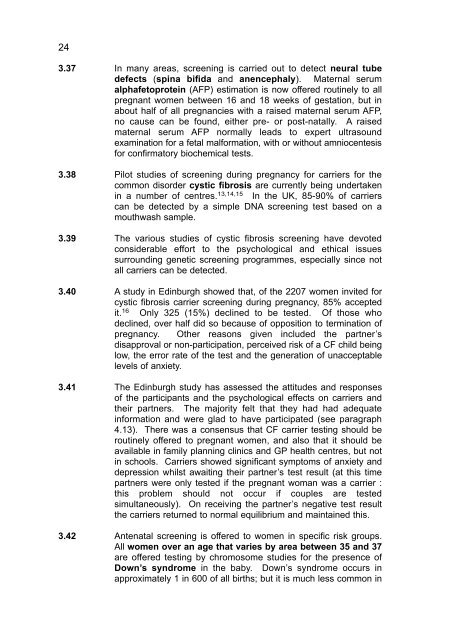Genetic screening: ethical issues - Nuffield Council on Bioethics
Genetic screening: ethical issues - Nuffield Council on Bioethics
Genetic screening: ethical issues - Nuffield Council on Bioethics
You also want an ePaper? Increase the reach of your titles
YUMPU automatically turns print PDFs into web optimized ePapers that Google loves.
24<br />
3.37 In many areas, <str<strong>on</strong>g>screening</str<strong>on</strong>g> is carried out to detect neural tube<br />
defects (spina bifida and anencephaly). Maternal serum<br />
alphafetoprotein (AFP) estimati<strong>on</strong> is now offered routinely to all<br />
pregnant women between 16 and 18 weeks of gestati<strong>on</strong>, but in<br />
about half of all pregnancies with a raised maternal serum AFP,<br />
no cause can be found, either pre- or post-natally. A raised<br />
maternal serum AFP normally leads to expert ultrasound<br />
examinati<strong>on</strong> for a fetal malformati<strong>on</strong>, with or without amniocentesis<br />
for c<strong>on</strong>firmatory biochemical tests.<br />
3.38 Pilot studies of <str<strong>on</strong>g>screening</str<strong>on</strong>g> during pregnancy for carriers for the<br />
comm<strong>on</strong> disorder cystic fibrosis are currently being undertaken<br />
in a number of centres. 13,14,15 In the UK, 85-90% of carriers<br />
can be detected by a simple DNA <str<strong>on</strong>g>screening</str<strong>on</strong>g> test based <strong>on</strong> a<br />
mouthwash sample.<br />
3.39 The various studies of cystic fibrosis <str<strong>on</strong>g>screening</str<strong>on</strong>g> have devoted<br />
c<strong>on</strong>siderable effort to the psychological and <str<strong>on</strong>g>ethical</str<strong>on</strong>g> <str<strong>on</strong>g>issues</str<strong>on</strong>g><br />
surrounding genetic <str<strong>on</strong>g>screening</str<strong>on</strong>g> programmes, especially since not<br />
all carriers can be detected.<br />
3.40 A study in Edinburgh showed that, of the 2207 women invited for<br />
cystic fibrosis carrier <str<strong>on</strong>g>screening</str<strong>on</strong>g> during pregnancy, 85% accepted<br />
it. 16 Only 325 (15%) declined to be tested. Of those who<br />
declined, over half did so because of oppositi<strong>on</strong> to terminati<strong>on</strong> of<br />
pregnancy. Other reas<strong>on</strong>s given included the partner’s<br />
disapproval or n<strong>on</strong>-participati<strong>on</strong>, perceived risk of a CF child being<br />
low, the error rate of the test and the generati<strong>on</strong> of unacceptable<br />
levels of anxiety.<br />
3.41 The Edinburgh study has assessed the attitudes and resp<strong>on</strong>ses<br />
of the participants and the psychological effects <strong>on</strong> carriers and<br />
their partners. The majority felt that they had had adequate<br />
informati<strong>on</strong> and were glad to have participated (see paragraph<br />
4.13). There was a c<strong>on</strong>sensus that CF carrier testing should be<br />
routinely offered to pregnant women, and also that it should be<br />
available in family planning clinics and GP health centres, but not<br />
in schools. Carriers showed significant symptoms of anxiety and<br />
depressi<strong>on</strong> whilst awaiting their partner’s test result (at this time<br />
partners were <strong>on</strong>ly tested if the pregnant woman was a carrier :<br />
this problem should not occur if couples are tested<br />
simultaneously). On receiving the partner’s negative test result<br />
the carriers returned to normal equilibrium and maintained this.<br />
3.42 Antenatal <str<strong>on</strong>g>screening</str<strong>on</strong>g> is offered to women in specific risk groups.<br />
All women over an age that varies by area between 35 and 37<br />
are offered testing by chromosome studies for the presence of<br />
Down’s syndrome in the baby. Down’s syndrome occurs in<br />
approximately 1 in 600 of all births; but it is much less comm<strong>on</strong> in
















